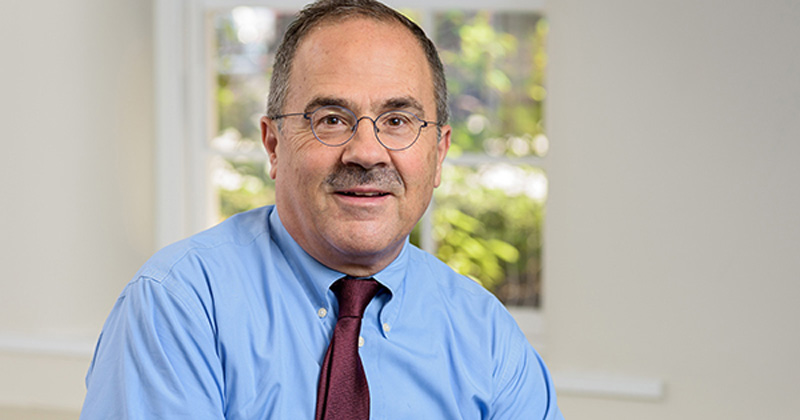

Could bacteria fuel the future?
August 31, 2018
With $1.5 million grant, UD engineers study microbes for biofuel production
A group of bacteria best known for causing stomach trouble could also be a source of sustainable energy.
The U.S. Department of Energy has awarded Eleftherios (Terry) Papoutsakis a three-year, $1.5 million grant to study the production of clostridium bacteria as platforms for biofuels. Papoutsakis, the Unidel Eugene du Pont Chair of Chemical and Biomolecular Engineering at the University of Delaware, will uncover fundamental insights about metabolism and environmental signaling in these microbes for use to produce fuels from renewable resources.
Papoutsakis has been studying clostridium bacteria for more than four decades. He was elected to the National Academy of Engineering in 2018 in part for his work with these microbes.
Clostridia are anaerobic bacteria that can be found in many environments that lack oxygen, from soil to parts of the human body. As these bacteria digest their food, which includes carbohydrates, proteins and many other molecules, they produce compounds such as butanol, acetone and ethanol, which are useful to makers of industrial chemicals and biofuels. Over the past few years, Papoutsakis has been utilizing unique combinations of bacteria to optimize this mix of metabolites.
“The idea is that you have a consortium of organisms that interact syntrophically, which means that one or more of them depends on the others to exist, so you create a stable consortium in nature to be able to do things that no one alone can do,” he said.
When multiple microbes are strategically combined, many additional new chemical reactions occur when they combine their metabolic capabilities.
“When they start interacting, you double or triple all the interactions and chemistry that normally goes on through biological events,” said Papoutsakis. “That makes the system complex and harder to understand than a single microbe. What do they exchange? How do they communicate? These things are not well understood, and we will address these questions.”
With this new grant, Papoutsakis and his team will study and optimize three new systems and study how the bacteria survive, multiply, send out signals and metabolize food. They will use a variety of experimental techniques such as flow-cytometry, time-lapse microscopy and polymerase chain reaction analysis. Maciek Antoniewicz, the Centennial Professor of Chemical and Biomolecular Engineering at UD, and Costas Maranas, the Donald B. Broughton Professor of Chemical Engineering at Penn State University, will collaborate with Papoutsakis on this project. Antoniewicz brings expertise in 13C metabolic flux analysis, a technique that takes snapshots of the metabolism inside bacterial cells. Maranas brings expertise in computational biology, modeling and studying metabolism at the genome scale. Graduate and undergraduate students will also contribute to the research endeavor.
As the researchers study the fundamental biology of consortia, they aim to figure out which mixes of bacteria can best be used to digest waste material and renewable biomass, such as scrap wood, and convert them into useful chemicals and fuel molecules.
Often in the biotechnology industry, scientists use a single type of bacteria for fermentation.
“In this project we aim to demonstrate that using two or more complementary microorganisms can dramatically improve process yields,” said Antoniewicz. “While microbial communities are very common in nature, they are not still widely used in the industry. With this project we hope change this by demonstrating the advantages of microbiomes as the basis for renewable bioprocesses.”
The ultimate goal is to create fuel in a more sustainable way, said Papoutsakis.
“We want the ability to recycle resources, use them for something else,” he said. “At the same time there are consortia that capture carbon dioxide, which is also important and makes this work attractive.”
The team is focused on applying their work to production of value-added chemicals and fuels from renewable resources and waste materials. However, it’s also plausible that their work could have far-reaching effects, even into human health.
“This is a growing field in biology, understanding complex microbial consortia and what they can do, which really is how nature does business,” said Papoutsakis. “It’s very difficult to understand on a molecular basis what really goes on. The field is opening up, and it’s sort of related to the microbiome, a complex consortium that exists in the skin, gut, mouth and other organs. They are full of microbes.”
This is also a growing field at UD.
“The biology or the microbiology of complex systems is a very interesting field, and there is a lot of activity in it here at UD,” said Papoutsakis. “We hope that we will see even expanded activity in that field because it brings together so much from various disciplines, from chemistry to biology to microbiology, imaging, computational biology; they’re all important areas and growth areas in science and technology, which makes this exciting.”
Contact Us
Have a UDaily story idea?
Contact us at ocm@udel.edu
Members of the press
Contact us at 302-831-NEWS or visit the Media Relations website


